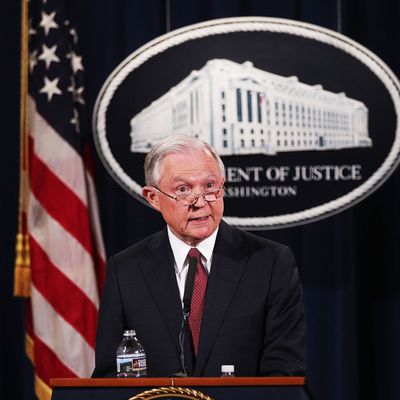
Unlike his predecessor in office, who looked Dreamers in the eye when he decided to grant them a temporary reprieve from deportation, Donald Trump wouldn’t dare tell them publicly he’d be ending the Deferred Action for Childhood Arrivals program, or DACA, their only lifeline in the only country most of them have ever known — he left that job to Attorney General Jeff Sessions. For the last five years, the program has offered these young Americans-in-the-making a shot at a dream many of us take for granted.
Without much of a moral compass to guide him, the president instead ducked responsibility for the needless suffering he’d be causing Dreamers by deferring to Congress, which since 2001 has tried and failed to pass legislation to shield these young immigrants — who never had the intent to violate the law — from a legal regime that otherwise treats them as deportable aliens that don’t belong here. Does anyone really believe that Trump, whose rode into office by attempting to appease a nationalist base, will sign a codified version of DACA that would give more than 800,000 undocumented immigrants a chance of joining the polity?
More cowardly still, he deputized the historically anti-immigrant Sessions to deliver the blow on DACA, which was couched in legalese and a veneer of compassion, and features a six-month “wind-down” period. When the DREAM Act failed in 2010, Sessions suggested Dreamers were no more than the kind of bad hombres Trump would later want to save us from: “This bill is a law that at its fundamental core is a reward for illegal activity,” he said at the time. He hasn’t changed. During his briefing Tuesday, he referred to them dismissively as “mostly adult illegal aliens.”
This is nonsense, as Dreamers, by and large, are decent, hard-working members of society who pay taxes, go to college, open businesses, and even risk their lives for fellow Americans when disaster strikes. Sessions, as the nation’s chief legal officer, likes to claim that DACA cannot remain on the books and is indefensible in court as a matter of constitutional law, but that’s false: The program has survived every legal challenge against it, has been in operation for half a decade, and is rooted in the federal government’s broad authority to set immigration priorities. As recently as 2012, the Supreme Court recognized the breadth of this power: “Discretion in the enforcement of immigration law embraces immediate human concerns.”
Let’s dispense with the meme that Trump was ever torn over DACA’s future because he wanted to treat his beneficiaries “with heart.” Or that his is a law-and-order presidency that believed DACA couldn’t survive because it was contrary to the rule of law. In his administration, respect for the legal process is a chimera: For its lawyers, a functional ban on Muslims from six countries entering the country is lawful because the president is owed the utmost deference over the enforcement of the immigration laws. And yet the president is rendered powerless over a modest program that spares certain immigrants for humanitarian reasons, all because Texas and other recalcitrant states threaten a meritless lawsuit.
By decreeing the death of DACA, Trump has again demonstrated that the rule of law is a nonconcern for his administration. For the president, lawless sheriffs who systematically violate the constitutional rights of brown-skinned Arizonans are deserving of mercy, but not aspiring citizens who have been making America great since the moment they were given a little grace.
“We’re a people of compassion and we’re a people of law,” declared Sessions without a hint of irony over the unspeakable cruelty DACA’s demise represents. This was a punch in the face to Dreamers, to advocates, to immigrants, and Americans like myself who once even helped would-be recipients as they fearfully, hopefully filled out applications for relief. These young immigrants won’t go down quietly. That’s not who they are. Undaunted by Trump’s empty appeals to what’s right and lawful, they’ll continue fighting and representing the very best America has to offer.





























